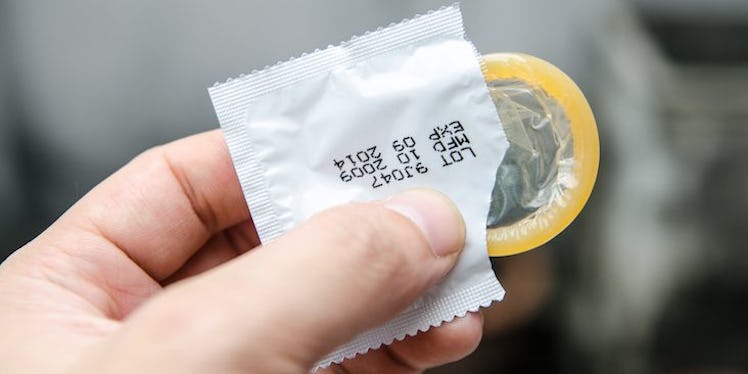
Is Stealthing Illegal? Here’s How Guys Can Get In Serious Trouble For It
Recently, a lesser-known form of sexual assault has come to light, leaving everyone wondering if they might have ever been a victim to this sex "trend" they didn't even know existed.
The trend itself is called "stealthing," and it involves a person secretly removing a condom during sex without the consent of the person they're having sex with.
At its core, it's a deceptive form of assault that can result in serious emotional and potentially physical distress for the victim.
So if that's the case, what are the legal implications of stealthing? Can guys actually get in trouble for it, considering it's technically a form of sexual assault?
Well, one lawyer explains that it may not be that easy, but it's still possible.
Julie Rendelman, a criminal defense attorney, tells Elite Daily, "'Stealthing' in New York is not in and of itself a criminal offense."
However, Rendelman says there are some circumstances where a victim of stealthing could potentially take legal action against the person who stealthed them.
What kind of legal consequences could there be in a stealthing case?
There could be grounds for a criminal charge in a stealthing case if the stealther knowingly passed on an STI or STD to the victim, Rendelman says.
She explains further,
If an individual were to 'stealth' another person knowing that he had some type of infectious venereal disease, he could be charged with a crime. Under New York Public Health Law, Section 2307, a person who, knowing himself or herself to be infected with an infectious venereal disease, has sexual intercourse with another, is guilty of a misdemeanor. In addition, it is possible that such an act could rise to the level of Reckless Endangerment, a more serious criminal charge.
Though, it should be said that, for the stealther, "there are certain possible defenses, even in the case of stealthing, such as the individual had no idea he had such a disease."
Are there any other cases where a victim of stealthing may be able to seek legal remedies?
"Along with a criminal prosecution, the victim can also sue civilly for damages, especially if they were diagnosed with an STD and it can be shown that he/she got that disease from the perpetrator," Rendelman says.
Even if the stealther did not give the victim an STI, the victim could potentially file a civil suit for damages (usually monetary compensation), Jeff Swartz, an associate professor of law with the Western Michigan University Cooley Law School, also tells Elite Daily.
Though, it's not certain the suit would be successful.
He says,
As a civil matter, the victim might be able to file the purposeful tort of battery, a case that would call for not only compensatory damages but also leave the defendant responsible for punitive damages. The basis of the claim would be, even though the victim gave consent for the contact, she did so with conditions where the offender violated the conditions of the consent. By violating the conditions, the consent is no longer valid and thus the conduct is without consent.
Essentially, the issues that arise are in relation to consent. As Swartz explains, a victim could make the argument that, in the case of stealthing, the conditions under which they consented changed.
Unfortunately, in most states, the current laws don't explicitly account for stealthing just yet.
Why are the laws currently so muddy when it comes to stealthing?
According to Rendelman, this all boils down to the fact that stealthing is still a relatively new concept.
"In terms of the law on stealthing, I think, unfortunately, this despicable behavior seems to be a fairly new trend that the legislature did not contemplate when the laws were created," she says
Zak Goldstein, a Philadelphia criminal defense lawyer, tells Elite Daily,
I do not think it would be an outrageous argument for a prosecutor to argue that 'stealthing' is sexual assault because it involves engaging in sexual intercourse without consent. The prosecutor would argue that the consent for the sexual intercourse came from the fraud or deception of agreeing to wear a condom even though the perpetrator knew that they would secretly remove it. It could be difficult to prove, however, because the prosecution would have to show that the removal of the condom was intentional and not an accident, and possibly that the complainant would have refused to engage in sexual intercourse without the condom. Sex crimes are difficult to prove in general, and this would be a novel prosecution and certainly no exception to that general rule.
However, as this horrendous action continues to gain exposure with the general public, it's possible we may see new legislation to reflect stealthing later on.
"It doesn't mean that these laws won't change to incorporate this behavior and other similar behaviors in the future," Rendelman says.
While each state's current laws in relation to stealthing may be different, hopefully we will continue to see changes to each state's legislation that will make it easier for victims of stealthing to come forward and take legal action against this awful act.